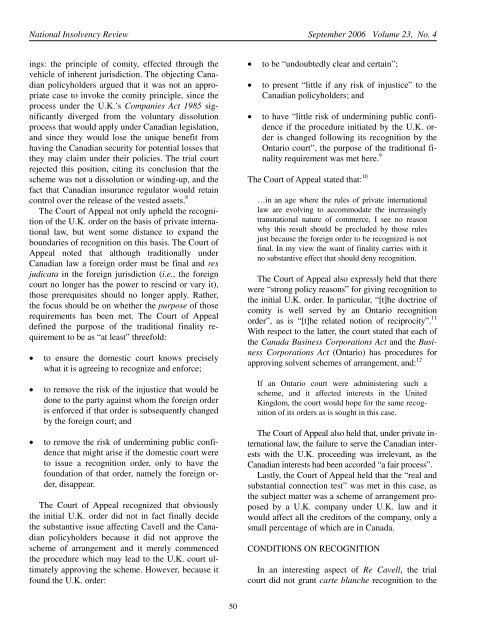important supreme court of canada decision on ... - Goodmans
important supreme court of canada decision on ... - Goodmans
important supreme court of canada decision on ... - Goodmans
Create successful ePaper yourself
Turn your PDF publications into a flip-book with our unique Google optimized e-Paper software.
Nati<strong>on</strong>al Insolvency Review September 2006 Volume 23, No. 4<br />
ings: the principle <str<strong>on</strong>g>of</str<strong>on</strong>g> comity, effected through the<br />
vehicle <str<strong>on</strong>g>of</str<strong>on</strong>g> inherent jurisdicti<strong>on</strong>. The objecting Canadian<br />
policyholders argued that it was not an appropriate<br />
case to invoke the comity principle, since the<br />
process under the U.K.’s Companies Act 1985 significantly<br />
diverged from the voluntary dissoluti<strong>on</strong><br />
process that would apply under Canadian legislati<strong>on</strong>,<br />
and since they would lose the unique benefit from<br />
having the Canadian security for potential losses that<br />
they may claim under their policies. The trial <str<strong>on</strong>g>court</str<strong>on</strong>g><br />
rejected this positi<strong>on</strong>, citing its c<strong>on</strong>clusi<strong>on</strong> that the<br />
scheme was not a dissoluti<strong>on</strong> or winding-up, and the<br />
fact that Canadian insurance regulator would retain<br />
c<strong>on</strong>trol over the release <str<strong>on</strong>g>of</str<strong>on</strong>g> the vested assets. 8<br />
The Court <str<strong>on</strong>g>of</str<strong>on</strong>g> Appeal not <strong>on</strong>ly upheld the recogniti<strong>on</strong><br />
<str<strong>on</strong>g>of</str<strong>on</strong>g> the U.K. order <strong>on</strong> the basis <str<strong>on</strong>g>of</str<strong>on</strong>g> private internati<strong>on</strong>al<br />
law, but went some distance to expand the<br />
boundaries <str<strong>on</strong>g>of</str<strong>on</strong>g> recogniti<strong>on</strong> <strong>on</strong> this basis. The Court <str<strong>on</strong>g>of</str<strong>on</strong>g><br />
Appeal noted that although traditi<strong>on</strong>ally under<br />
Canadian law a foreign order must be final and res<br />
judicata in the foreign jurisdicti<strong>on</strong> (i.e., the foreign<br />
<str<strong>on</strong>g>court</str<strong>on</strong>g> no l<strong>on</strong>ger has the power to rescind or vary it),<br />
those prerequisites should no l<strong>on</strong>ger apply. Rather,<br />
the focus should be <strong>on</strong> whether the purpose <str<strong>on</strong>g>of</str<strong>on</strong>g> those<br />
requirements has been met. The Court <str<strong>on</strong>g>of</str<strong>on</strong>g> Appeal<br />
defined the purpose <str<strong>on</strong>g>of</str<strong>on</strong>g> the traditi<strong>on</strong>al finality requirement<br />
to be as “at least” threefold:<br />
• to ensure the domestic <str<strong>on</strong>g>court</str<strong>on</strong>g> knows precisely<br />
what it is agreeing to recognize and enforce;<br />
• to remove the risk <str<strong>on</strong>g>of</str<strong>on</strong>g> the injustice that would be<br />
d<strong>on</strong>e to the party against whom the foreign order<br />
is enforced if that order is subsequently changed<br />
by the foreign <str<strong>on</strong>g>court</str<strong>on</strong>g>; and<br />
• to remove the risk <str<strong>on</strong>g>of</str<strong>on</strong>g> undermining public c<strong>on</strong>fidence<br />
that might arise if the domestic <str<strong>on</strong>g>court</str<strong>on</strong>g> were<br />
to issue a recogniti<strong>on</strong> order, <strong>on</strong>ly to have the<br />
foundati<strong>on</strong> <str<strong>on</strong>g>of</str<strong>on</strong>g> that order, namely the foreign order,<br />
disappear.<br />
The Court <str<strong>on</strong>g>of</str<strong>on</strong>g> Appeal recognized that obviously<br />
the initial U.K. order did not in fact finally decide<br />
the substantive issue affecting Cavell and the Canadian<br />
policyholders because it did not approve the<br />
scheme <str<strong>on</strong>g>of</str<strong>on</strong>g> arrangement and it merely commenced<br />
the procedure which may lead to the U.K. <str<strong>on</strong>g>court</str<strong>on</strong>g> ultimately<br />
approving the scheme. However, because it<br />
found the U.K. order:<br />
• to be “undoubtedly clear and certain”;<br />
• to present “little if any risk <str<strong>on</strong>g>of</str<strong>on</strong>g> injustice” to the<br />
Canadian policyholders; and<br />
• to have “little risk <str<strong>on</strong>g>of</str<strong>on</strong>g> undermining public c<strong>on</strong>fidence<br />
if the procedure initiated by the U.K. order<br />
is changed following its recogniti<strong>on</strong> by the<br />
Ontario <str<strong>on</strong>g>court</str<strong>on</strong>g>”, the purpose <str<strong>on</strong>g>of</str<strong>on</strong>g> the traditi<strong>on</strong>al finality<br />
requirement was met here. 9<br />
The Court <str<strong>on</strong>g>of</str<strong>on</strong>g> Appeal stated that: 10<br />
…in an age where the rules <str<strong>on</strong>g>of</str<strong>on</strong>g> private internati<strong>on</strong>al<br />
law are evolving to accommodate the increasingly<br />
transnati<strong>on</strong>al nature <str<strong>on</strong>g>of</str<strong>on</strong>g> commerce, I see no reas<strong>on</strong><br />
why this result should be precluded by those rules<br />
just because the foreign order to be recognized is not<br />
final. In my view the want <str<strong>on</strong>g>of</str<strong>on</strong>g> finality carries with it<br />
no substantive effect that should deny recogniti<strong>on</strong>.<br />
The Court <str<strong>on</strong>g>of</str<strong>on</strong>g> Appeal also expressly held that there<br />
were “str<strong>on</strong>g policy reas<strong>on</strong>s” for giving recogniti<strong>on</strong> to<br />
the initial U.K. order. In particular, “[t]he doctrine <str<strong>on</strong>g>of</str<strong>on</strong>g><br />
comity is well served by an Ontario recogniti<strong>on</strong><br />
order”, as is “[t]he related noti<strong>on</strong> <str<strong>on</strong>g>of</str<strong>on</strong>g> reciprocity”. 11<br />
With respect to the latter, the <str<strong>on</strong>g>court</str<strong>on</strong>g> stated that each <str<strong>on</strong>g>of</str<strong>on</strong>g><br />
the Canada Business Corporati<strong>on</strong>s Act and the Business<br />
Corporati<strong>on</strong>s Act (Ontario) has procedures for<br />
approving solvent schemes <str<strong>on</strong>g>of</str<strong>on</strong>g> arrangement, and: 12<br />
If an Ontario <str<strong>on</strong>g>court</str<strong>on</strong>g> were administering such a<br />
scheme, and it affected interests in the United<br />
Kingdom, the <str<strong>on</strong>g>court</str<strong>on</strong>g> would hope for the same recogniti<strong>on</strong><br />
<str<strong>on</strong>g>of</str<strong>on</strong>g> its orders as is sought in this case.<br />
The Court <str<strong>on</strong>g>of</str<strong>on</strong>g> Appeal also held that, under private internati<strong>on</strong>al<br />
law, the failure to serve the Canadian interests<br />
with the U.K. proceeding was irrelevant, as the<br />
Canadian interests had been accorded “a fair process”.<br />
Lastly, the Court <str<strong>on</strong>g>of</str<strong>on</strong>g> Appeal held that the “real and<br />
substantial c<strong>on</strong>necti<strong>on</strong> test” was met in this case, as<br />
the subject matter was a scheme <str<strong>on</strong>g>of</str<strong>on</strong>g> arrangement proposed<br />
by a U.K. company under U.K. law and it<br />
would affect all the creditors <str<strong>on</strong>g>of</str<strong>on</strong>g> the company, <strong>on</strong>ly a<br />
small percentage <str<strong>on</strong>g>of</str<strong>on</strong>g> which are in Canada.<br />
CONDITIONS ON RECOGNITION<br />
In an interesting aspect <str<strong>on</strong>g>of</str<strong>on</strong>g> Re Cavell, the trial<br />
<str<strong>on</strong>g>court</str<strong>on</strong>g> did not grant carte blanche recogniti<strong>on</strong> to the<br />
50
















